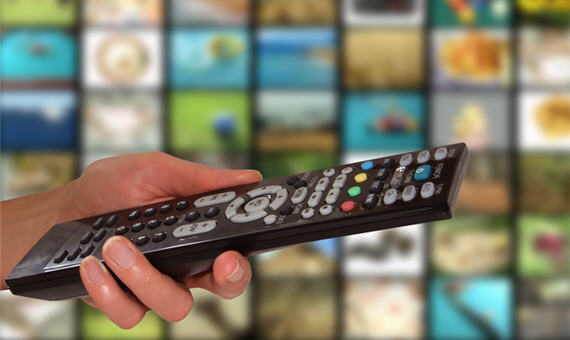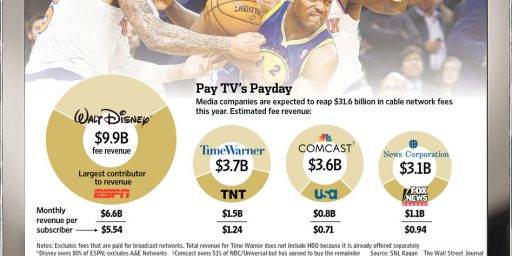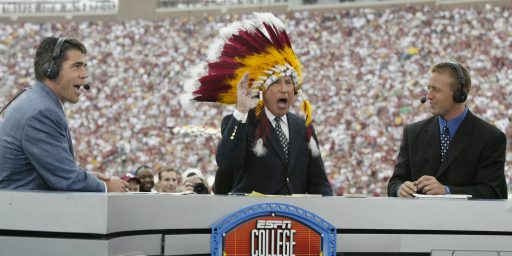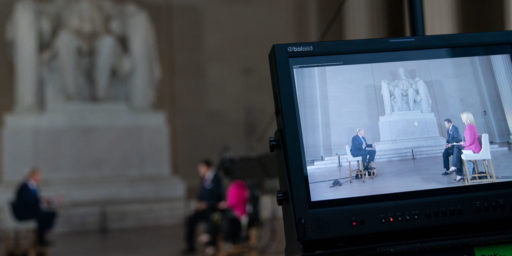Unbundling Cable Packages Would Be More Expensive, But Its Probably The Future
Would your cable bill be cheaper if you could just subscribe to the channels you wanted to watch?
One of the most common ideas that cable/dish television customers seem to complain about these days is the fact that they are forced to pay for subscription packages that include channels that they rarely if ever watch in order to get access to the ones they do want. On some level, it’s one that’s easy to understand and be sympathetic with. After all, if you’re someone who primary watches the sports channels, with the possible edition of channels like AMC in order to be able to watch Mad Men, along with the news and business channels that you watch in the morning or the evening (we’ll leave the premium channels like HBO out of this discussion for obvious reasons), then why should you have to pay for a package that includes networks you’ll never watch like Lifetime, Oxygen, or the various and sundry iterations of MTV and its related networks? The issue has even made its way to the halls of Capitol Hill, where Senators like John McCain have advocated changes in Federal Law that would force cable companies to offer channels on an a la carte basis.
Most advocates of a la carte cable packages seem to be operating on the idea that this would ultimately be cheaper for consumers. As it turns out, though, that most likely isn’t the case:
People watch an average of 16 channels per month, according to Variety’s Andrew Wallenstein, yet typically pay for something like 124, per numbers from the FCC. But, paying for all 16 of your favorite channels separately would add up quickly.
ESPN, for example, if sold on its own, would cost somewhere in the $20 to $30 dollar range, according to various analyses. HBO, another valuable property, would cost more than the $15 or $20 per month it gets in the cable bundle. Then add in AMC for Mad Men, Bravo for Top Chef, the FX for Louie, and other sports channels for lesser sporting events, and you’re nearing that average $73.44 Americans pay for cable TV. Plus, you might feel compelled to add on more channels just in case of special programming events, like Sharknado on SyFy. Even if each one of those cost less than the $10 per month, as the TV industry says they would, that’s still nearly a $100 per month bill.
The current system is a deal specifically because all cable subscribers are paying for channels they never ever watch. “We are all paying each other’s TV taxes,” Derek Thompson explains over at The Atlantic. The people who don’t ever watch ESPN pay $4.69 per month, but in turn people who never watch AMC pay around $3.50 per month. “The idea is that if 100+ million households all pay $70ish a month for television, the breadth of the customer base will support a diverse and thriving entertainment business without asking any group to pay too much for what they want.” Unbundling the channels would put more of a financial burden on each person.
In addition, a la carte channels would have to charge even more because the audience drop would result in decreased advertising revenue. The bundle brings more viewers to channels—you can’t channel surf your way onto a station you would never watch if you don’t pay for it a la carte. It’s also a guaranteed sell to advertisers. AMC can say, look we have access to all of Comcast’s subscribers. Unbundling that would ruin everything—in theory.
Additionally, some networks would disappear entirely because they would likely be unable to attract sufficient subscribers to make up for the likely loss in advertising revenue that they would experience from being detached from the wider universe of Comcast or Time Warner subscribers. And the ripple effects wouldn’t stop there. ESPN would likely face revenue losses of its own as a result of the loss of actual and potential viewers, even for something as popular as its Sunday Night Baseball and Monday Night Football products. And, we don’t know what impact a move like this would have on the broadcast network that are part of every “basic” cable package in the country. I don’t know about anyone else, but given the choice I’m not sure I’d “subscribe to all four of the major broadcast networks. Fox, CBS, and NBC would be on the list most likely because of their sports offerings, but I can honestly say there’s nothing on ABC I watch on the regular basis, and little I watch on the other networks outside of their various sports offerings and, perhaps, breaking news. Other people would make their choices based on different criteria. It would, in other words, cause a massive shift in the economy of the entire television industry the consequences of which are hard to foresee, other than the likelihood that its liable to end up being more expensive for consumers, especially for people who only watch one or two shows on a given network regularly but would have to pay to “subscribe” to that network as a whole, even those shows they don’t watch. Indeed, if we introduce the idea of “subscribing” to individual channels then can the idea of “subscribing” to individual shows be far behind?
Perhaps that’s where all of this is headed, the end of television as we’ve known it since the 1950s and the beginning of an era where people are just watching individual shows without regard to what channel, if any, they might be on. Indeed, the introduction of shows like House of Cards and the return of Arrested Development on Netflix may just be the beginning of that era. Even if these types of shows are ad-supported, it’s a phenomenon that’s likely to make the overall viewing experience more expensive, at least for people who tend to watch a lot of television. Perhaps that will change over the long term, but one thing that is clear is that, at least immediately, a la carte programming, if it comes, is likely to come with something of a sticker shock for many cable customers who may be thinking at the moment that its the secret to reducing that hated monthly bill.






My question is why do lawmakers feel they need to involve themselves in something that should be a market issue?
I get over a hundred HD channels of which I watch perhaps 8 and only 3 or 4 on a regular basis. I stream a lot of movies and TV shows on netflix, probably at least 50% of my TV viewing. I would be curious to see how this would work out for me.
@Sherry Taylor: It’s not a market issue since we currently don’t have a choice – it’s all or nothing.
@Ron Beasley:
Fair point. Although I’m going to guess that in order for most cable companies to offer a la carte services it would require upgrades to equipment, etc that would no doubt also be passed on to consumers
@Ron Beasley:
I have and HD-capable television but I simply choose not to pay the extra for the HD part of my cable company’s offerings. However it’s perfect for DVD’s and streaming media that is increasingly starting to come in HD format.
Admittedly, I don’t know the nuances of television profitability, but dammit sumpin’s gotta give!!
Ever since Netflix started producing their own content, I imagined a world one day where other entertainment producers could follow their model.
Imagine, if HBO, Showtime, AMC, FX, and other producers of like-minded content could consolidate their content in one Netflixesque format. I’d easily shell out $50-60 a month for something like that.
People watch an average of 16 channels per month…
Right. But aren’t they the typical 16 channels for people with similar tastes? Everyone I know that watches MadMen also watch Game of Thrones. People who watch Homeland are the same people who watch The Wire. Sunny in Philadelphia and Louie. So on and so forth.
If Netflix can do it and turn a profit, it seems feasible that other producers can do the same.
As far as sports are concerned, I don’t know why ESPN and such simply doesn’t broadcast their content over the airways. ESPN and other sports channels are not commercial free – in fact Sports Center can’t go 5 minutes it seems without breaking away for commercials. And it’s not like they’re showing anything that NBC doesn’t show. But whatever.
Moreover, Netflix originals are released by the season. All episodes of Arrested Developement came online all at once. And for gritty serial dramas, it is much more enjoyable to watch them all at once if you want, or two to three at a time… Much better that way.
And if AMC had something similar, then on August 11, I could watch the entire final season of Breaking Bad, back-to-back, like the gods intended.
Cheers.
p.s. Who the %#$@ watches commercials anyway??? Don’t you people have DVR’s??? 🙂
@PogueMahone:
As I said in the post I think what Netflix has done is pointing at least part of the way to the future of programming. However, it’s not necessarily a model that is going to work for every type of program on every type of network. There will still be, I would imagine, some types of programming that will find it a better fit to remain commercially sponsored in some manner even if they are available online and/or via “subscription.”
I’m not even going to try to guess what the “television” (will that word even matter in 10-15 years?) market in 10-15 years. There are entrepreneurs far more visionary than I that are probably thinking about that as we speak. I do know it’s going to be very different from what we see today.
I think channels will become much less important than production companies. Eventually the production companies will sell their episodes a la carte through an online store.
@Doug Mataconis:
That or crowdfunding.
Fans of a number of shows that got cancelled after only a season or less would really want this.
Big Bang Theory has a lot viewers, but how many of them would be willing to directly pay for episodes? How many Community viewers would be willing to directly pay to get new eps? Are there more “fanatical” Community fans out there than Big Bang Theory fans?
Also, there’s no reason to limit those paying to the US. HBO could have people all over the world pay for their next big show. In advance. Global fans of Joss Whedon’s work could finance his next tv show. And so on.
Now, I don’t think it’s ready yet. But it’s coming.
As an example, an episode of Game of Thrones seems to cost about $6 million. Does anyone doubt that HBO wouldn’t be able to find, for instance, 15 million people world wide willing to pay 50 cents per episode (and get to download and keep the episodes)?
Winter is coming. 😉
The real question is how many networks or shows would exist if they have to get every viewer to pay for the privilege of watching. That means when a new program comes along, not only does a view have to choose to watch but they also have to choose to pay.
I also suspect that it would be every bad for most sports leagues in the long run since having to pay for each sport means that the casual fan will not longer watch. The economic example is how pay per view killed boxing and will probably kill other sports.
Currently watching programs on netflix or streamed over the interview in just a secondary funding stream for shows. How many shows would exist if it is the primary source of funding.
Unbundling may happen, but it will be over the dead bodies of the cable networks. Most critics of unbundling imagine it will be cheaper-but this has been consistently debunked. Like it nor not, a la carte is more expensive than bundling-which is why bundling will continue.Also too, live sports. For lots of guys, that’s a must.
What is great these days is that you can cut the cord and still have great entertainment options. I did, and I am doing quite well with a combination of digital OTA,(58 channels, including a number of PBS),streaming Netflix,and DVDs from the library. I am testing out an Apple TV, with gives access to iTunes movie and TV rentals and a gazillion podcasts.
Bottom line, I get all the entertainment I want for less than cable. I doubt I’m going back.
@PogueMahone:
No, but broadcasting rights for sports are extremely expensive.
Unbundling would be quite a bit cheaper for me, actually. The only reason I pay Comcast anything is to get HBO Go (and I’d consider dropping that if shows came to Amazon or iTunes more quickly) and the NHL and MLB, since restrictions force their streaming services to blackout both local and playoff games. Everything else I can get elsewhere.
Of course some would end up paying more but increased competition usually results in lowering prices. I just don’t see any downside to giving consumers a choice. The only thing preventing content creators from offering their content a la carte are big monopolies that demand a cut of the action. There was a time when these monopolies made sense and they were regulated. We are long past the need for them and the regulation seems to have disappeared.
I get hundreds of Channels. How many do the people in my house seriously watch
ESPN, ESPN2, Golf Channel, PBS, Fox Sports Florida, Me TV, Our local ABC affiliate for Jeopardy!, CNBC
The Wife watches ABS-CBN, EWTN, CBS, Fox, and NBC affiliates (mostly for news), Wealth Channel
That’s 14 channels.
Sometimes I will switch over overfrom the satelite to the antenna. There are just a few stations, but they are crystal clear, and free. Someone is missing out on a wide open opportunity because there is a demand for free tv. We dropped cable after twenty some years. The customer service became lousy and they did nothing to try to keep us as customers, I was surprised at their attitude.
Cable in Korea runs about $20/month (including broadband internet–and the cable company lets you keep cable for free even after your broadband subscription runs out and you don’t renew). On the other hand, all of the “actual” cable content–the Korean equivalent of HBO, FX, high interest sports programing, current movies, etc,–is VoD or pay by the minute internet streaming. Most of my friends have smartphone bills in the $150/month + range. (With about 2 hour constant use battery life. Then it’s on to the charger for 4 or more hours.)
Just be careful what you wish for in your “I don’t want to pay for things I don’t use” libertarian paradise.
If we had al a cart channel purchasing I would be only paying for 2, maybe 3 channels. NBC because I watch the Today show in the mornings, BBC America for Doctor Who, and maybe Scifi (I refuse to use it’s current name)… if they got smart and stopped showing all the stupid wrestling and fake reality shows.
As it is now, I only subscribe to the local networks through cable along with my internet service. I buy Doctor Who and Mythbusters through Amazon in their season packs, paying like $2.00 an episode. Everything else I wait until it either hits Netflix or Amazon Prime.
Streaming is the future. TV channels that are unthinkable in most cable packages can be sold individually via streaming (BSkyB is doing that with their newschannels in English and in Italian). For advertisers, streaming offers the possibility of customizing ads to each viewer – that´s fair more efficient than the cable model.
Bundling did have one major benefit in the recent past: it allowed channels like AMC and FX to develop and grow from re-running old movies and mediocre sitcoms with a smattering of mediocre new content into channels now showing some of the best television shows that have ever existed.
In an a la carte universe AMC would either not exist anymore or would still be showing old movies; FX would still have crappy original content sandwiched between Friends reruns. Bundling allowed the space, time and money for some niche channels to develop original programming that is actually worth watching.
@Doug Mataconis: You know, I haven’t subscribed to a television provider in six years and can honestly say I don’t feel I’ve missed a thing. I stream something via Amazon Prime or buy the DVD and don’t have to endure hours of ads telling me I suck because I haven’t bought their products.
People keep saying this, but I am not at all convinced. I get how bundling works and can lower total costs, nonetheless it sure sounds to me like the self-serving argument of the cable providers and the cable TV channels. “Trust us, you won’t like it if we give you a choice.”
No one has so far mentioned any TV channels that are not fairly mainstream that they actually watch. I bet that those 16 channels that most people actually watch are drawn from no more than 40 or 50 out of the 124, and if the least watched 50 were a la carte they would go out of business – and we wouldn’t be subsidizing them. That would save us all something.
If not for hockey I would be Internet streaming only for everything else I watch.
Sure you often have to wait until a season is over to find a show on Netflix but I am able to wait if needed.
Not sure I want to see cable go al a carte because I agree with those who say it will get more expensive-I would love to see production companies take their ideas to Netflix and the like. I admit I am rather addicted to watching TV with no commercials.
@MichaelB
I think the people who aren’t watching ESPN/AMC/FX/etc are actually subsidizing those who do.
These 50 least watch channels are most likely cheaper than ESPN/AMC/FX/etc, but in order to be able to watch them people has to also pay for ESPN/AMC/FX/etc, which means that if you were able to pay only for those channels you would want then you would end up paying more for ESPN/AMC/FX/etc.
These 50 least channels on the other hand would go out of business because not enough would watch them in a a la carte world. They may be cheap (so the ESPN/AMC/FX/etc viewers aren’t really giving them a lot of money) but there wouldn’t be enough viewers to pay for them on their own.
Symbiosis, to put it simple.
If that knucklehead McCain is involved we are all about to get f’ed. Does anyone really think he is advocating for the consumer?
I pay way too much every month to DirecTV.
But un-bundling it isn’t going to make it cheaper.
If ESPN is $30 a month…throw in SPEED, NBCSN, Velocity, Discovery, USA, TNT, FX, and you can’t ignore HBO, Starrz, SHO, and MAX. Pretty soon my current bill looks like a bargain.
Tell McCain to go rub one out over the idea of bombing Iran…and leave my god-damned 62″ HDTV alone.
So I’d have to actually suck it up and pay full freight for my Yankees games… or decide it’s not worth it. Works for me.
My house uses maybe 5 channels, tops?
YES, during baseball season
The Weather Channel
HBO
Discovery
Science
Whichever one has Chopped… TLC?
And we already have started to occasionally pay-per-view (now “On Demand”) for movies, so it’s not such a great stretch to pay for a particular channel or show.
I certainly could see it being bad for the industry. I also think superdestroyer’s point about sports leagues is possible. MLB makes absurd amounts of money from TV broadcasting rights. But if you force fans to really pay for that, and non-fans can opt out, the result will be a lot of folks deciding oh to hell with it. MLB is far and away the sport I care most about (others being tennis, for the majors only, and ice hockey, playoffs only) and $ isn’t really a constraint for us, but I could easily see us deciding that it isn’t worth the $, particularly if the Yankees keep going the way they’re going (not only potentially bad, but old, boring and bad – a lethal combo for fan interest).
Anyway, in general, bring it on.
@MichaelB:
The exception proves the rule? 100% of channels I watch: CSPAN 1-3, PBS, Science – Military – History 2, Smithsonian, NASA, and the Pentagon channel. All but CSPAN 1 and PBS are considered digital “deluxe” meaning addressable converter required along with the deluxe subscription.
Mrs pedals needs the HBO and Showtime but otherwise watches the local channels
Our cable bill has been increasing at several times inflation for several years now, and my wife and I were just discussing the other night whether we could get by without cable. I asked her to write down every show that she watches, and I did the same. I found that basically every single show we watch is either available on Netflix, Hulu Plus or one of the streaming sports services. MLB and NHL both have live stream subscriptions, and almost all of my local NFL team’s games are on CBS or Fox, which I could get for free with a digital antenna. The only exception is Monday night games on ESPN.
Netflix, Hulu Plus, MLB.tv, and NHL GameCenter added up together are less than $30/month.
The main wrench in the plans is HBO, which you currently can’t stream online unless you already have an HBO cable subscription. I really wish HBO would offer HBOGO as a separate service.
I am in a similar spot to some others here: I haven’t had cable at all since 2009, and had it intermittantly from 2003 to 2009. Basically, “tv” for me is a combination of Netflix, Hulu+, Amazon Prime, and network streaming sites. I prefer to watch serialized television in chunks rather than one episode per week (a pattern I developed due to Lost), so I don’t mind waiting a while to be able to sit down over the course a few days and watch an entire season of Game of Thrones or Dexter.
I also – and I really do wish the network would actually ask people about this instead of assuming we’re all one step away from piracy – don’t mind watching a reasonable number of commercials when streaming (by reasonable, I would say 50 – 100% of what the live viewer sees). I understand the economics of television, and I am happy to cover the cost of producing shows I enjoy. I just want to watch them at the time of my choosing and at less cost than an HD cable subscription plus DVR fees.
Regarding cable bill creep: you can reduce that somewhat if you’re willing to call them once a year and complain. I literally set myself an Outlook reminder: call Comcast. So I do, and they magically work out a discount. I still pay a lot, less than I would if I just stayed silent. It’s a pretty pathetic business practice, IMO, but it’s reality, at least for now.
So call! Then if your bill is still too high, consider other options (like Ben). I’ve stuck with cable in part because I’ve got phone and internet bundled up with the TV.
@Rob in CT:
Trust me, I’ve called and called. They find a “discount”, but all that does is bring the yearly increase down from 15% to about 10%.
Folks should take a look at Matthew Yglesias’s column, À La Carte Won’t Fix Cable:
I watch, I dunno, maybe 10-12 channels on DirecTV (including premium channels). I’m really paying, as Matt says, for those channels. If an a la carte system costs me as much, or probably more, to watch those 10-12, channels, while foregoing the occasional viewing of the other channels (as I’m now watching the British Open on ESPN), how am I benefited?
The only reason I haven’t ditched cable entirely in favor of Hulu & Netflix is live sports. Once that’s worked out, Time Warner gets a lot less of my money.
@Sherry Taylor:
What market? I have one choice and one choice only for cable, how is the market even coming into play?